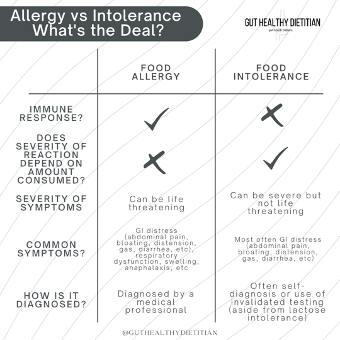In this post we are going to dive into what is the difference between food allergy and food intolerance and, most importantly, why you should care about the distinction! If you’re hoping to learn more about allergies or intolerances – this article is for you. Let’s cut out the misinformation!
First off: Food Allergy vs Intolerance

Both an allergy and an intolerance are an adverse (negative) reaction, however an allergy is immune-mediated. This means that your immune system is driving the reaction. Your immune system is made up of many different components that function to protect your body against threats.
For example, let’s think about when you receive a vaccine. Your body is exposed to a small amount of viral components (virus) that prompt your body to respond and destroy the virus to keep you safe. Your immune system learns from that reaction and the next time it’s exposed to the same virus it knows how to destroy it. Sometimes our bodies make mistakes and develop these reactions to things that don’t cause us harm like certain foods, medications or things in the environment.
Food Intolerance Vs Food Allergy:
A food allergy is defined as an “adverse health effect arising from a specific immune response that occurs reproducibly on exposure to a given food” (2). This means that EVERY time someone is exposed to a certain type of food (even in very small or trace amounts) they have a reaction. This can be a life-threatening response (2). Food allergies are categorized as IgE-mediated, mixed IgE allergies and non-IgE-mediated allergies. The categorization tells us which part of the immune system is involved in the reaction.
The most common and well understood type of food allergy is the IgE-mediated reaction (IgE stands for immunoglobulin E, a specific antibody) which commonly occurs in reaction to certain proteins found in foods and can lead to an anaphylactic reaction. In this type of reaction, the first time you are exposed to a certain allergen, your body will respond by creating an IgE antibody.
The next time you consume that allergen, your immune system will remember it and produce an allergic reaction by releasing histamine and other chemicals which cause subsequent reactions in your body. There are many different types of allergic reactions which we won’t get into here.
What are the symptoms of food allergies?
Some symptoms of food allergies are more commonly recognized like anaphylaxis, hives, swelling underneath the skin, swelling around/in the eyes, but can also include excessive tearing, nasal congestion/sneezing, hoarseness, coughing, runny nose, chest tightness, wheezing, shortness of breath, reflux, vomiting, diarrhea, nausea, hypotension, dizziness, fainting, loss of consciousness (2)
What are the most common food allergies?

The most common allergens in Canada are peanuts, tree nuts, sesame seeds, milk, eggs, fish, crustaceans and molluscus (shellfish), soy, wheat and triticale (hybrid of wheat and rye), sulphites, mustard (3). It is very important that if you think you have a food allergy that you see an allergy specialist for diagnosis as allergies can be life threatening and can progress over time.
What about food intolerances?
These are foods that elicit reproducible adverse reactions without immunologic mechanisms (2). This often presents as GI symptoms including abdominal pain, bloating, distension, gas and diarrhea and are usually caused by an inability to digest/absorb food or food components. While food allergies give us a reaction independent of dose, food intolerances often tend to be dose-dependent (2). This means that when a person consumes a larger portion of the food, they will have a more severe reaction compared to when they consume a smaller portion of a food. A very common food intolerance is lactose intolerance.
Often with food intolerances there is an amount of a food that can be consumed without symptoms appearing. This varies person to person and can be impacted by many factors. This is significantly different from a food allergy where no amount of an allergen is safe.
Food intolerances can also be common symptoms of IBS and by eliminating trigger foods (ie. FODMAPs) and allowing the gut a period of rest, you can often reintroduce foods without an issue. So, in some instances, food intolerances can be temporary or a symptom of a larger digestive issue.
Should I be tested for food intolerances or sensitivities?
When you type that question into google, the first 4 results are advertisements for food intolerance or sensitivity test kits with price tags ranging from $119-$389 for these tests. Some of these tests use blood, some use hair and some use saliva. We get this question on a daily basis from clients, wondering if they should be tested for food intolerances based on their digestive issues.
Unfortunately, there are almost no validated tests for food intolerances or “sensitivities” (aside from lactose intolerance which has scientifically validated testing!). IgG food sensitivity testing has become more common among the general population with increased availability of these tests in the private sector. Unfortunately, these are also not validated and the Canadian Society of Allergy and Clinical Immunology (CSACI) recommends against their use in identifying food sensitivities, intolerances or allergies (4A). Instead, current literature suggests that IgG shows previous exposure and likely tolerance to foods (4A).
What’s the harm in avoiding certain foods if it makes me feel better?
All of this being said, if you feel better not eating certain foods, ALL the power to you! We are all in charge of our own dietary choices and we support you in whatever choices you make for yourself.
However, I often see in practice people who are cutting out certain foods to better their health or improve symptoms but when we get into it, cutting out those foods either only improved their symptoms temporarily or didn’t improve their symptoms but they continue to restrict these foods – sometimes on the advice of alternative health care practitioners, sometimes based on these food sensitivity tests and sometimes just as an attempt to improve the very real symptoms they are experiencing.
Food restrictions can impact the quality of your gut microbiota – your gut microbiota THRIVES on diversity so ideally we want to include as many foods as we can to support those little microbes. If you’re cutting out foods and still seeing symptoms – this is an issue and should be addressed! If you’re avoiding foods, it may be beneficial to speak with a dietitian to make sure you aren’t missing out on any important nutrients for your microbes or for your health.
References:
- https://pubmed.ncbi.nlm.nih.gov/34068047/ (Food Allergy and Intolerance: A Narrative Review on Nutritional Concerns)
- https://pubmed.ncbi.nlm.nih.gov/21134568/ (Guidelines for the Diagnosis and Management of Food Allergy in the United States: Summary of the NIAID-Sponsored Expert Panel Report)
- https://www.canada.ca/en/health-canada/services/food-allergies-intolerances/food-allergies.html
- https://www.ncbi.nlm.nih.gov/pmc/articles/PMC3443017/ (CSACI Position statement on the testing of food-specific IgG)



Leave a Reply